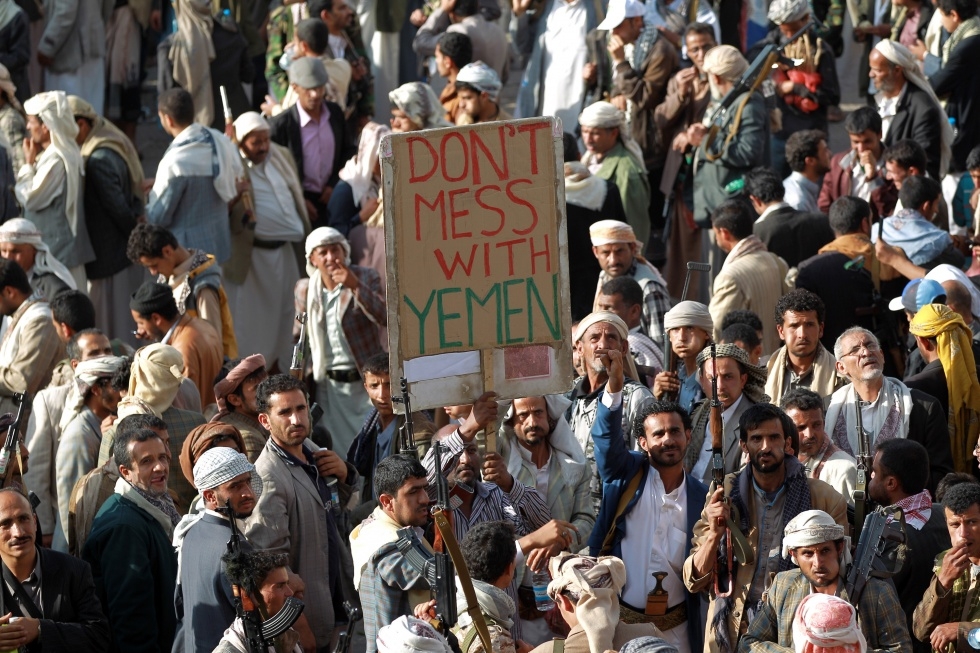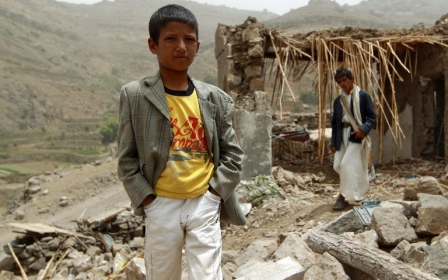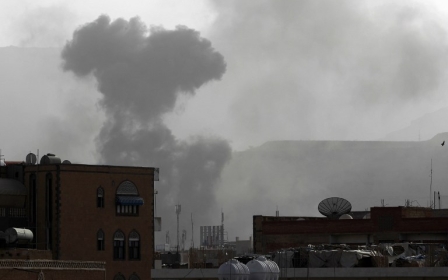Iran prepares for long Yemen war

The war in Yemen is intensifying, as illustrated by US Secretary of State John Kerry’s blunt warning to Iran to stay out of the conflict. This comes on the heels of reports that the 34th fleet of the Iranian navy has set sail for the Gulf of Aden and the Bab al-Mandab Strait, ostensibly on an anti-piracy mission.
While a direct military intervention by Iran is extremely unlikely, the dispatch of the flotilla, comprised of a logistic vessel and a destroyer, comes at a sensitive time and is designed to send a message of steely determination to the Saudi-led coalition bombing Yemen.
The despatch of the flotilla is a double-edged sword, for whilst it projects strength it is also a sign of weakness inasmuch as it illustrates Iran’s inability to intervene effectively inside Yemen on the side of its putative Houthi allies.
Nevertheless, despite a relatively weak hand, Iran appears to be intent on staying engaged in the Yemen conflict, as evidenced by tough posturing by both the Iranian president and the supreme leader, with the latter predicting a “bloody” Saudi defeat in Yemen.
A weak hand
As the events of the past two weeks have illustrated, Iran has a weak hand in Yemen and practically no effective means of furnishing its putative Houthi allies with decisive support.
This apparent weakness notwithstanding, accusations of Iranian support to the Houthis continue to be made by Riyadh and now Washington, as illustrated by Kerry’s latest statement on the conflict.
Yet neither Riyadh nor Washington can produce even barely credible evidence to support their claims. This has forced the lowering of the evidentiary threshold to the point of flagging up chartered Iranian flights to Sanaa as proof of Iranian support to the Houthis.
Moreover, accusations of Iranian support in the form of military supplies (allegedly ferried into Yemen on board chartered flights) does not take stock of the situation on the ground, namely the well-known fact that Yemen is awash with an assortment of weapons. The Houthis and their allies do not need Iranian weapons, much less military advisors, to prosecute a successful military campaign in Yemen.
Notwithstanding genuine Iranian affection for the Houthis, the Iranian interest in Yemen is less bound up with the fortunes of the latter than fears of the impact and precedence of the Saudi-led coalition. Specifically, Iran fears that in the event of a successful outcome in Yemen, the Saudis might be tempted to project force in other regional conflict zones.
There was a veiled reference to this in Ayatollah Khamenei’s latest statement on Yemen, when he talked about a transformation in Saudi foreign policy from one of cautious manoeuvring to barbarity (i.e. use of force).
Khamenei blames a “few young and inexperienced” Saudi officials for this transformation, presumably referring to political changes inside the Kingdom since King Abdullah’s demise in January.
Fears of a more strident Saudi foreign policy are compounded by fears of a wider Sunni alignment, especially as important non-Arab powers, namely Turkey and Pakistan, have expressed support for the Saudi-led intervention.
Furthermore, the pan-Arab military force touted by Egypt, if it ever comes to fruition, can change the regional balance of power to Iran’s disadvantage, hence applying even greater pressure on Iranian leaders to stay engaged in the Yemen conflict.
Even President Rouhani, who is keen on rebuilding bridges with Saudi Arabia, has come out to attack the Saudi-led onslaught in Yemen in surprisingly strong terms. Claiming that Yemen will not submit to bombing, Rouhani implicitly compared the Saudi-led military campaign to failed US-led military campaigns in the region.
A long war
The conflicts in Yemen are primarily local with the key drivers being the inequitable distribution of power, most of which transcend sectarian boundaries. The Houthi advance notwithstanding, it is worth remembering that the central political divide in Yemen is between north and south and the country risks partition the longer the local wars drag on.
The Saudi-led intervention is conveniently painted in sectarian terms as a pushback against Iran’s expanding regional influence, thus obscuring Saudi Arabia’s real motives in resorting to force. Some of these motives are benign, indeed understandable, as Saudi Arabia needs to protect its long border and strategic coastline from intensifying instability in Yemen.
Moreover, the Kingdom is fearful of the growing influence of al-Qaeda in the Arabian Peninsula (AQAP), even though ironically, in the short term at least, the aerial bombing campaign is benefiting AQAP and its allies. The Houthis, after all, are the Sunni militants' natural antagonists.
As previously stated, Iran is not so much fearful of the defeat of the Houthis, but of the consequences of a Saudi success in Yemen. Lacking the means to counter the Saudi-led aerial campaign, Iran is banking on the prospect of Saudi Arabia getting mired in a war of attrition in Yemen.
The unfolding of this scenario was implicit in Ayatollah Khamenei’s statement on Yemen. The Iranian leader even went as far as predicting a bloody Saudi defeat by drawing a comparison between Saudi actions in Yemen and repeated Israeli offensives in the besieged Gaza Strip.
At an emotional level this comparison is highly evocative, but its real intention is to illuminate Saudi weakness at the strategic level. Khamenei says that Israel was unable to defeat Gaza even though Israel’s military strength is incomparable to that of Saudi Arabia, and despite the fact that Gaza is a small and besieged territory whereas Yemen is a large country with a population of over 20 million.
From Khamenei’s statement it is clear that Iran is preparing for a long conflict in Yemen. Whilst contrary to Saudi and American claims, Iran’s actual influence in Yemen is limited, the irony is that the longer this conflict drags on the more influential Iran will become. Saudi propaganda on Yemen is a classic case of being careful for what you wish for.
- Mahan Abedin is an analyst of Iranian politics. He is the director of the research group Dysart Consulting.
The views expressed in this article belong to the author and do not necessarily reflect the editorial policy of Middle East Eye.
Photo: A crowd of men protest with guns and slogans in the streets of Aden (AFP)
New MEE newsletter: Jerusalem Dispatch
Sign up to get the latest insights and analysis on Israel-Palestine, alongside Turkey Unpacked and other MEE newsletters
Middle East Eye delivers independent and unrivalled coverage and analysis of the Middle East, North Africa and beyond. To learn more about republishing this content and the associated fees, please fill out this form. More about MEE can be found here.





